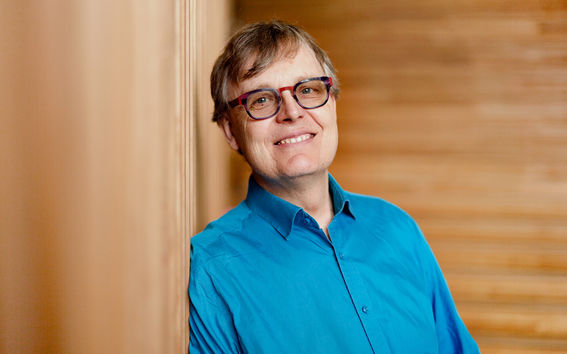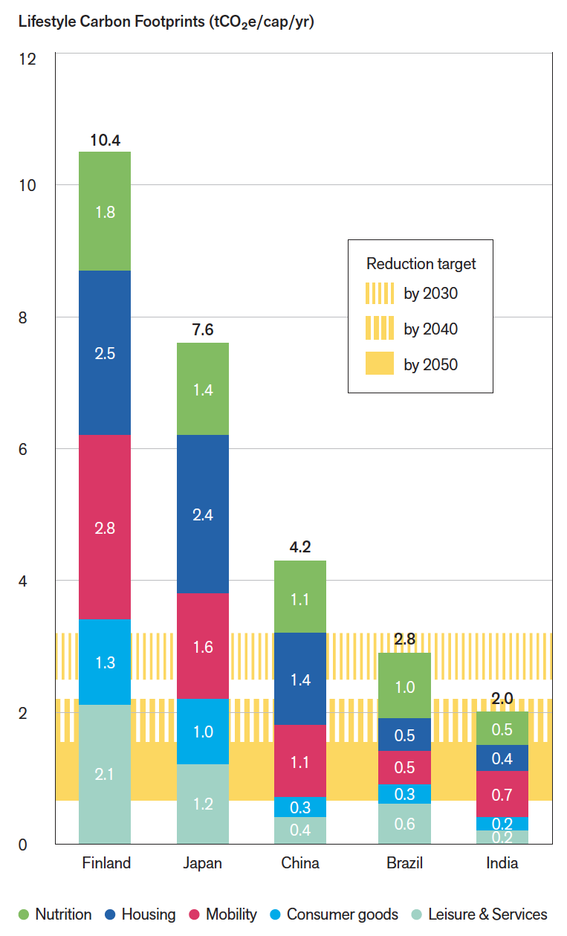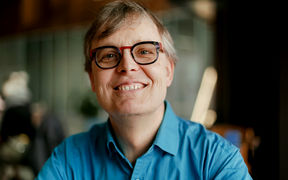What can you do for the climate?


According to Postdoctoral Researcher Michael Lettenmeier, when it comes to climate change, we don't need to argue whether the responsibility for making changes lies with politicians or individuals.
The reality is that, in the next ten years, we all need to reduce our impact and even nature-loving Finns need to cut down more than 75% of their carbon footprint. 'Although political decisions, structures and infrastructure have the greatest impact, this is not an either/or question. Individuals should also make lifestyle changes,’ Lettenmeier says.
As one of the head researchers of the 1.5 Degree Lifestyles research study commissioned by the Finnish Innovation Fund Sitra, he should know. In fact, Lettenmeier encourages people to make both small and major changes in lifestyle choices and ways of thinking. ‘Small streams make great rivers. A small permanent change is better than none,’ he emphasises.
There is a long way to go. In 2017, the average Finn's annual carbon footprint was 10.4 tonnes CO2e; the target for 2030 is less than one-quarter of that amount, 2.5 tonnes CO2e. To achieve this ambitious – and vital – goal requires an annual decrease of 12%.
‘Every year we delay action further increases the need for reduction,’ Lettenmeier points out.
What kinds of actions will help?
Three parts of our lifestyle – transport, housing and food production – account for almost 70% of Finland's carbon footprint.
Here are Lettenmeier's tips for a more climate-friendly life:
Travel by bike or train
- Take car-free days and travel by bike or public transport. If you live close to your workplace, biking offers a good way to promote your physical health. Ask for support from your workplace for using public transport. Rail transport is clearly the lowest emitting mode of public transport. An electric car is better than a combustion engine, but its material footprint is still problematic.
- Fly less frequently and make shorter trips. I have been happy to see how rapidly the number of members of the Finnish ‘Maata pitkin matkustavat’ (‘Travelling by land’) Facebook group has grown. It's good that people look for train travel options for their long-distance holidays.
- Attend meetings and events remotely as often as possible or reserve time for travelling by train. Ask your employer for the possibility to work remotely.
Live energy efficiently
- Switch to eco-electricity, which is based on the use of renewable energy sources. Wind power is the best solution because of its low environmental impact.
- Seal your windows and keep room temperature to a maximum of 20°C. Drying laundry outside reduces heating costs.
- If you have a roof, you can use solar panels and become a small-scale energy producer. In Germany, citizens already produce half of renewable energy with their own equipment.
- When you move, choose a smaller apartment that is closer to your workplace. The smaller the space, the less energy it takes to heat. The shorter the distances you need to travel every day, the better.
- If you want to build a house, build an energy-efficient wooden home. Wood construction also acts as a carbon sink.
Eat less meat and fewer milk products, and reduce food waste
- More people should have vegetarian days and the more they have, the better. Try flexible vegetarianism or flexitarianism. Not everybody needs to immediately turn vegan or vegetarian. Adding vegetables to your diet is a healthy change. In our research, we found that in Brazil, as a source of protein people eat around 70 kg of climate-friendly beans per person per year, whereas in Finland only 1.2 kg of beans and a few kilograms of peas are eaten per person per year.
- Reducing food waste decreases food’s carbon footprint.
- You should ask restaurants about their vegetarian options. The more people ask, the greater the pressure to offer tasty options.
- Order vegetables and fruits for the workplace instead of pastries.
These actions already have major impact but here's another point of action, especially topical with the coming EU elections.
‘Vote for a brave politician who, despite opposition, focuses on sustainable solutions, such as congestion charges and removing car subsidies. Politicians are usually more conservative than citizens, because the people who oppose difficult decisions are the most vocal. Nevertheless, they should have the courage to make changes. We need decision-makers who are brave enough to make bold climate decisions and can take criticism,’ emphasises Lettenmeier.
We need to design climate-friendly solutions
‘Everyone should start taking action and making changes for the benefit of our climate – there is no alternative. After all, many lifestyle changes also lead to a better quality of life. People can also achieve change through everyday work and politics. It’s a good idea to consider what you could do to combat climate change in your work,’ Lettenmeier says.
'Companies should also promote sustainable lifestyles by developing and selling products and services that reduce carbon footprints. Good examples include Pulled Oats, RESQ Club and Whim, but we need more of these innovative companies,' he adds.
Live in Finland? Do the Lifestyle Test - how much carbon do YOU use? (in English)
Read the international 1.5 Degree Lifestyles research report (in English)
See Sitra's 1.5 Degree Lifestyles publication (in Finnish)
1.5 Degree Lifestyles is an international research report commissioned by the Finnish Innovation Fund Sitra compares the carbon footprints of different countries and lifestyles. The research calculations made by the international research team can help politicians make better political decisions to achieve the 1.5-degree target of the Intergovernmental Panel on Climate Change (IPCC).
The report by the Intergovernmental Panel on Climate Change (IPCC), published in October 2018, explicitly recommends rapid emission reductions in order to limit the global temperature rise to 1.5°C. Food production and the availability of clean water as well as biodiversity are more secure in a world with a 1.5 degree rise as compared to 2 degrees.
Cold choices for a warming planet
A new study from Finland and Japan lays out the massive extent to which our lifestyles need to change if we are to slow down global warming.

Read more news
Soil Laboratory Exhibition – Exploring the Dialogue Between Human and the Earth in Utsjoki
Soil Laboratory explores the relationship between humans and the earth as a living landscape through ceramic practices in Utsjoki.
The Finnish Cultural Foundation awarded grants for science and art
A total of 15 individuals or groups from Aalto University received grants
Environmental Structure of the Year 2025 Award goes to Kalasatama-Pasila tramway
The award is given in recognition of meritorious design and implementation of the built environment. Experts from Aalto University developed sustainability solutions for the project.






